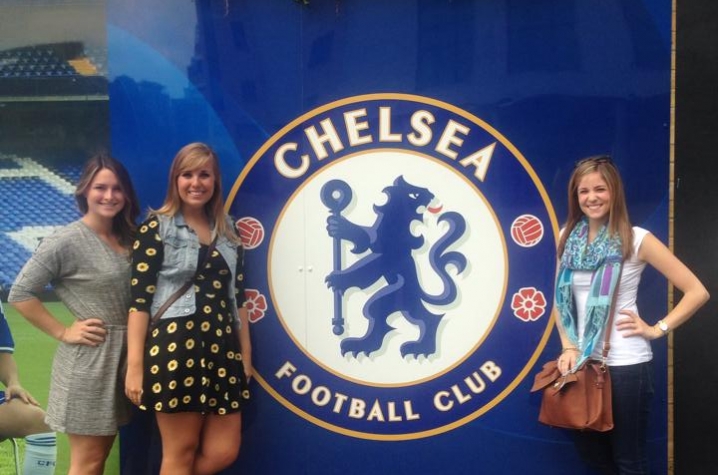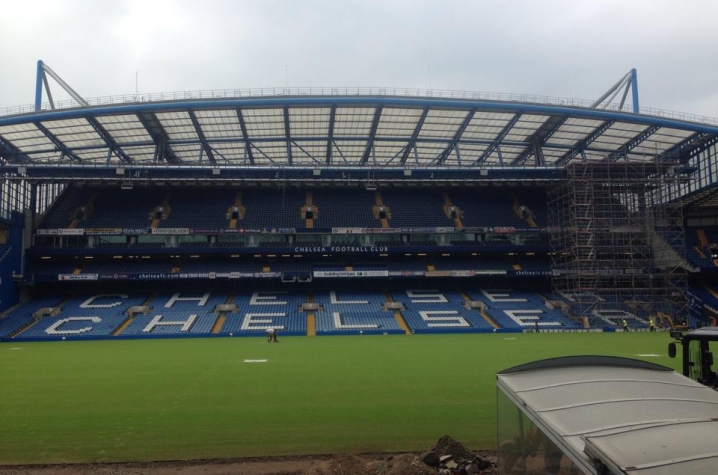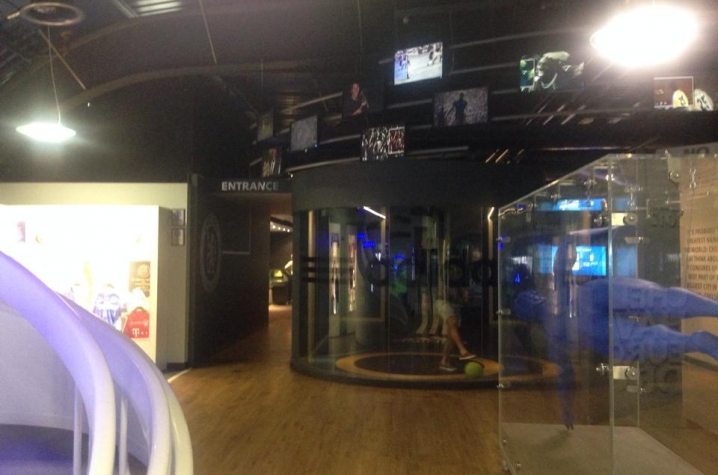Blue Abroad: Touring the Chelsea Football Club
LONDON, ENGLAND (June 26, 2014) — Fifteen first-generation University of Kentucky students are seeing blue across the Atlantic this summer. In a course designed specifically for first-generation students, the group is exploring global communication and business in London, England, led by Director of First Generation Initiatives Matthew Deffendall.
Throughout three weeks spanning the end of June and beginning of July, the students are visiting several international businesses and corporations, and UKNow is highlighting some of their experiences by publishing their blogs.
On Monday, June 19, the class toured the stadium of one of the most successful football clubs in Great Britain: the Chelsea Football Club. Beginning in the stadium seats, the tour then continued through the press conference room, the home and visiting locker rooms, as well as the press box in the stadium. The tour commenced in the Chelsea Football Club museum — a tribute to the success of the club, which included interactive "skill-building" displays, hanging jerseys of notable Chelsea players and opponents, as well as videos from the team's most memorable wins.
After the tour, a former financial representative, Stephen Pearce, from the Chelsea Football Club gave a lecture about the European football industry. Pearce recently transitioned from Chelsea to a smaller football club, Derby County, a club that last year generated enough momentum to ascend from the near bottom of their league's standings, to second place. He described the structure and financial workings of the industry and asked the students to compare European football to similar industries in the U.S.
Below is a blog from sophomore chemistry major Brandon King:
The tour of the Chelsea Football Club was a very interesting trip. It was more of a superficial tour, as we only saw the inside of the stadium, the changing rooms, the press rooms, etc. The inner workings were not touched on in the stadium tour. This was left for later in the evening when one of the former financial directors for Chelsea came to talk to us. Now, he helps to manage the finances for the Derby Football Club, a local football team on the rise from a hard period in their career.
The Derby director gave a very extensive look into the workings of managing a football club, and many techniques and tactics were quite similar to the workings of professional sports in the United States. In order to fund the club, they need extensive sponsorship — as many as possible from as many different kinds of companies as possible. The director mentioned that they recently got a new deal to rename the stadium iPro stadium, the largest financial sponsorship deal in recent times. For the next 10 years, their names will be connected.
In addition, they need public exposure to help bring in fans and raise money. The more the team is known about, and spoken about, the more success they will have. They do kids camps so they can come and talk to the pros and learn from them. In addition, they have a deal so that if the team makes it into the English Premier League (the tier they very nearly made it into, but sadly lost their promotion match), all season pass owners will be refunded half the price.
On the other hand, though, there are a few differences between American professional sports. The professional arena for the English and the American leagues are quite unique from each other. A lot of importance is placed on reaching the top tiers in England due to the level of sponsorship that is offered for those contenders.
In addition, the amount of trading and buying players is on a much higher level than in the States. In addition to trading, the players are often lent (literally loaned) to other teams so that they can get experience in lower leagues before they return to play for their main team. This is not as common in American sports, and was a surprising bit of information — especially when a list of players traded to other teams was given, including the prices paid and the success of the players.
One of the primary means of public and global communication for the Derby team was the usage of the Twitter page. It was used to advertise ticket sales, progress in training, news about the team, games, etc. This has helped to revitalize the public fandom for the team and raise morale in the team as well. Due to the recent upturn in the team’s success, their number of followers has increased significantly.
Before this trip, I had no idea of the behind-the-scenes deals that a football club needs to do to operate, including the sponsorships, promotions, techniques for public exposure, team management changes, etc. It was a very enjoyable trip!
MEDIA CONTACT: Sarah Geegan, (859) 257-5365; sarah.geegan@uky.edu










